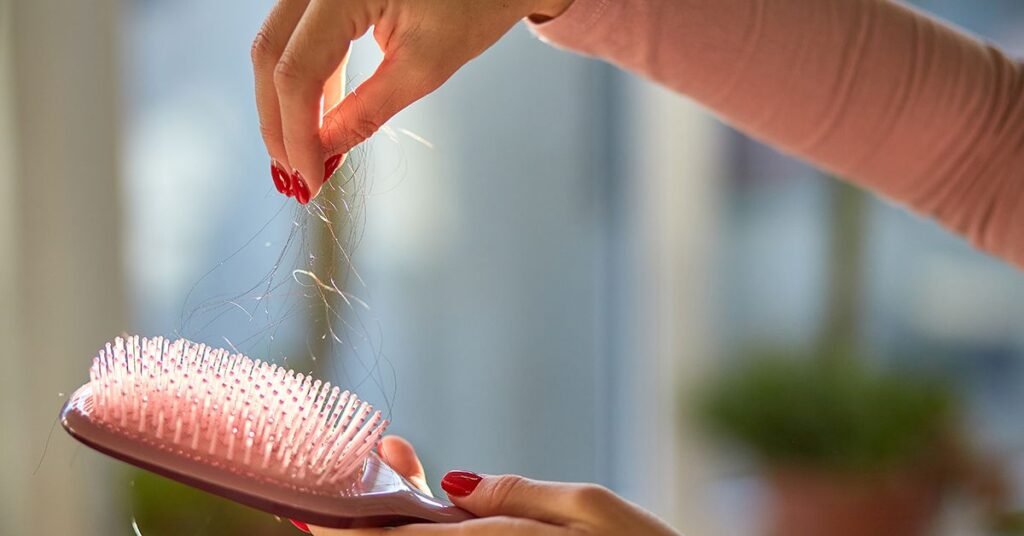Understanding GLP-1 Related Hair Loss: Causes, Effects, and Remedies
GLP-1-related hair loss is usually a temporary side effect, with available treatments to aid regrowth. Source: Bondarillia/Getty Images
What is GLP-1 and Why is Hair Loss a Side Effect?
GLP-1 (Glucagon-like peptide-1) drugs are primarily used for weight loss and diabetes management. While effective, many individuals using these medications have reported experiencing temporary hair loss. This phenomenon has sparked interest among healthcare providers and patients alike.
Is Hair Loss Permanent?
The good news is that hair loss linked to GLP-1 usage is generally considered temporary. However, understanding its underlying causes is crucial for effectively managing this side effect.
“We see this frequently in the office,” says Dr. Marisa Garshick, a board-certified dermatologist.
The Connection Between Weight Loss and Hair Shedding
Why Does Weight Loss Cause Hair Loss?
Experts suggest that the hair loss associated with GLP-1 drugs is not directly due to the medications but is instead correlated with the significant weight loss these drugs facilitate. When the body undergoes such changes, any kind of stress—physical or emotional—can lead to a type of hair loss known as telogen effluvium.
- Weight Loss Stress: Continuous weight loss can act as a prolonged stressor, disrupting the normal hair growth cycle.
- Time Frame: Interestingly, this type of hair shedding may not be immediate. Some individuals report noticing hair loss months after starting treatment.
Signs and Symptoms of GLP-1 Related Hair Loss
If you have recently initiated a GLP-1 treatment and notice increased hair shedding, consider the following:
- Recent changes in weight
- Any new medications
- Major life changes or stress
Dr. Jenni Holman emphasizes that this ongoing shedding is unique because the stress from weight loss persists longer than from a singular event.
Additional Factors Influencing Hair Health
Hair loss can also stem from other causes:
- Nutritional deficiencies: Lack of essential nutrients can exacerbate hair shedding.
- Endocrine disorders: Hormonal imbalances also play a significant role.
Key Nutrients for Healthy Hair
- Protein: Essential for hair structure, ensure adequate intake while on GLP-1.
- Vitamins: Address potential deficiencies—especially Vitamin D, zinc, and iron. Low levels can lead to hair loss.
How to Manage GLP-1 Related Hair Loss
Several treatments are available to help combat hair loss resulting from GLP-1 use. These can range from dietary changes to specialized supplements and medications.
Recommended Treatments
-
Nutraceuticals: Although evidence is inconsistent, some supplements (like Nutrafol and Viviscal) have shown promise. Always consult a healthcare provider before starting any new supplements.
-
Dietary Improvements: Focus on nutrient-rich foods to bolster hair health. This may help mitigate deficiencies that contribute to hair loss.
- Hair Care Products:
- Topical Serums: Products with platelet-derived exosomes may promote hair regrowth.
- Shampoos: Medicated shampoos containing ketoconazole can support hair health.
Topical Treatments
- Minoxidil: Approved since the mid-1980s, this topical treatment promotes overall hair growth, even in cases where the shedding is linked to weight loss.
- PRP Therapy: This involves using a patient’s own blood to stimulate hair follicles and promote regrowth.
Utilizing Technology for Hair Regrowth
Consider at-home treatment options such as red light therapy, which may help expedite hair regrowth when paired with other treatments.
Setting Realistic Expectations
Time Frame for Hair Regrowth
It’s important to recognize that regrowing hair can require patience. According to Dr. Garshick, results may take 6 to 12 months after weight stabilization, while Dr. Holman suggests it can take 12 to 18 months to fully reset the hair growth cycle.
Consulting Professionals
If you’re experiencing significant hair loss while on GLP-1 medications, reaching out to a board-certified dermatologist is a prudent step. They can provide tailored advice and treatment options catering to your specific situation.
Final Thoughts
Though GLP-1-related hair loss can be concerning, it’s typically a temporary effect that resolves once the underlying stress of weight loss is addressed. If you’re navigating this side effect, remember that monitoring your nutritional intake and seeking professional guidance can significantly aid in reversing hair loss.
Note
For further information on hair loss treatments and nutritional guidance, consider reputable resources like the American Academy of Dermatology and Cleveland Clinic.
By addressing hair loss proactively, you can better manage the side effects of GLP-1 medications, ensuring a smoother transition toward your health goals.


